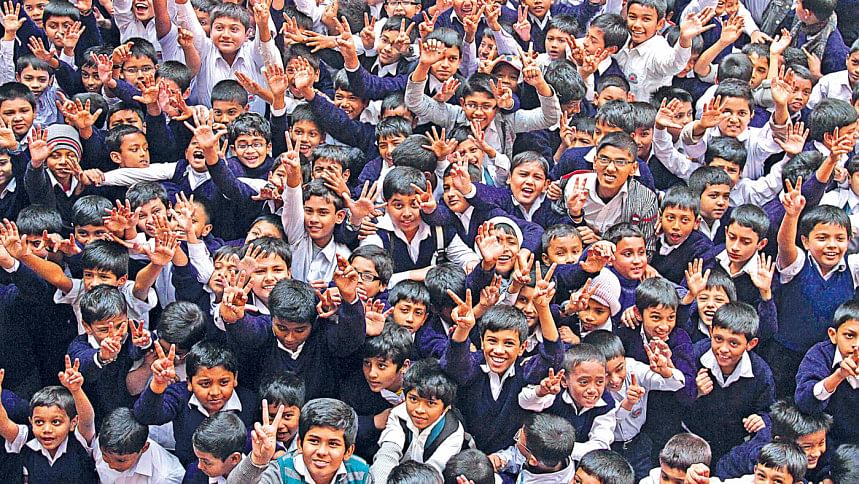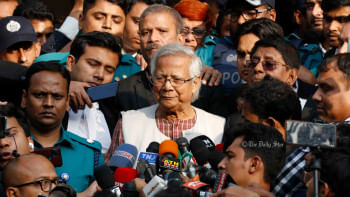Invest in the future by focusing on education

Despite being small in terms of geography, Bangladesh currently ranks 8th in terms of population. Additionally, it is currently experiencing a demographic dividend, with 65.6% of its population being of working age. In order to turn this large population into a valuable resource, Bangladesh must invest in its people, and one essential way to do that is through providing proper education. This aligns with the theme of this year's International Education Day, "Invest in People, Prioritize Education"
Current scenario
Bangladesh has made significant strides in increasing access to primary education in recent years. The Annual Primary School Census 2021 reports that nearly 98% of primary-school-aged children are enrolled in school, indicating near-universal access to primary education. Additionally, Bangladesh has achieved gender parity in primary and secondary schools, with 49.5% of girls enrolled in primary and 54.92% in secondary schools.
While the progress in primary education is commendable, the trend of students dropping out at secondary and tertiary levels is a significant concern. The prolonged school closures caused by the pandemic have exacerbated this issue. According to the Bangladesh Education Statistics 2021 report, there was a 6% decrease in secondary school completion rates for girls and a corresponding increase in dropout rates from 2020 to 2021. One major factor contributing to this trend is early marriages, which have become more prevalent as households have faced financial difficulties during the pandemic.
Additionally, a report by the University Grants Commission indicates that 2.49 lakh university students have dropped out between 2020 and 2021. The lack of attention from the government to revamp the education sector is also concerning. As per the budget for the fiscal year 2022-23, only 1.83% of the country's GDP is allocated for education, which falls short of the recommended minimum of 2% according to Prof. Serajul Islam Choudhury. He also points out that the budget that is allocated is not being implemented properly.
Quality of education
Bangladesh boasts a literacy rate of 74.91%, but a report by UNICEF (2022) shows that only 34% of third graders in the country can read proficiently, and only 18% can do basic math. The prolonged school closures caused by the COVID-19 pandemic have greatly impacted these young learners' foundations. However, it is important to note that the education challenges faced by children in Bangladesh predate the pandemic.
Bangladesh is on the brink of the 4th Industrial Revolution (4IR), which calls for its citizens to possess a diverse set of skills, including digital literacy, ICT knowledge, emotional intelligence, analytical thinking, etc. to be able to compete in the global economy. To fully participate in this revolution, the country must re-evaluate its education system and ensure that it meets the demands of the 4IR.
Private universities have played a crucial role in producing graduates with the necessary skills and competencies. However, recent complaints have emerged that these institutions have become mere degree-issuing machines. Graduates are facing difficulty in getting employed and employers are expressing their dissatisfaction with the lack of suitably skilled candidates.
Dr. Md. Anwarul Kabir, Vice Chancellor of the State University of Bangladesh, emphasizes the importance of improving the quality of education in the country. He suggests investing more in labs, research, and quality textbooks in all universities in order to reach the level of success of countries like South Korea. He also points out that a well-educated population is essential for achieving the goal of a developed Bangladesh by 2041, and that failure to provide quality education will hinder progress.
The quality of education is closely tied to the quality of the learning environment. Public universities have traditionally been a source of well-educated individuals, but due to factors such as politicization, haphazard expansion, and inadequate facilities, the standard of these environments has declined.
The Vice Chancellor of the University of Dhaka, Professor Dr. Md. Akhtaruzzaman, notes that the situation has improved significantly from what it was 20 to 25 years ago. He acknowledges that it is a continuous effort to improve education and that the country is still catching up with technological advancements. However, he expresses optimism that in 10 years, the country will reach its desired destination.
Next steps
Education is considered to be the great equaliser, yet in Bangladesh, the three streams of education (English medium, Bangla medium, and Madrassa) are a significant weakness in the education system. According to Prof. Serajul Islam Choudhury, these streams are widening and deepening class divisions and undermining national unity.
He also highlights that quality education is impossible without dedicated and talented teachers. He suggest that teachers be given proper allowances and the respect they deserve in society and government should create a sustainable and promising career path for them.
In conclusion, the development of Bangladesh is heavily dependent on its ability to tap into the potential of its population and turn them into valuable human resources, which can only be achieved through quality education. Therefore, investing in education is the key to investing in people, and ultimately, prosperity.
Sarah Bintay Shakahwat is a journalist at The Daily Star.

 For all latest news, follow The Daily Star's Google News channel.
For all latest news, follow The Daily Star's Google News channel. 




Comments